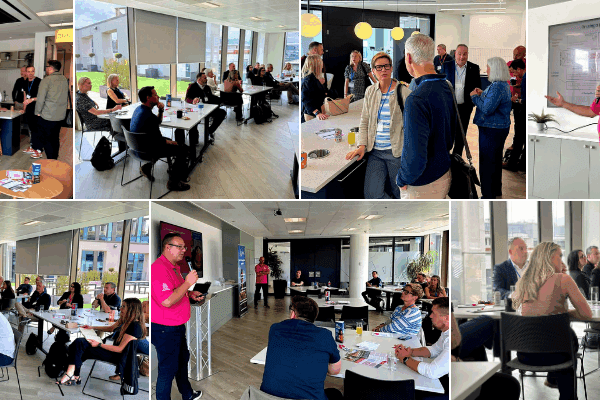Our latest article in the MERJE Meets series features Leanard Phillip, a leader in financial crime compliance and anti-money laundering.
As the MLRO at Knight Frank, Leanard brings extensive expertise in safeguarding businesses against financial crime, with a career spanning law enforcement, international tribunals, and financial services. His journey—from the Trinidad and Tobago Police Service to the United Nations International Criminal Tribunal for the Former Yugoslavia (UNICTY), and later into senior compliance and MLRO roles—has been defined by a deep understanding of regulatory frameworks and a commitment to ethical, risk-aware decision-making.
Drawing on his experience across AML/CFT, bribery and corruption, sanctions compliance, and fraud prevention, Leanard has shaped robust compliance frameworks that balance regulatory requirements with commercial pragmatism. His approach emphasises culture, integrity, and collaboration, ensuring compliance functions are not just regulatory checkboxes but strategic enablers for the business.
Join us for this exclusive Q&A as we explore Leanard’s professional journey, insights on financial crime compliance, and vision for building resilient, risk-aware organisations.
Your career started in law enforcement with the Trinidad and Tobago Police Service and the UN. How has that foundation influenced your approach to financial crime compliance in the financial sector?
My career began in law enforcement with the Trinidad and Tobago Police Service and later the United Nations International Criminal Tribunal for the Former Yugoslavia (UNICTY), where I witnessed first-hand how criminal networks move money, conceal corruption, and exploit weak systems. I also worked as a criminal intelligence analyst for The Independent Inquiry Committee into the Iraq Oil-for-Food Programme (IIC). These experiences taught me that compliance isn’t just about rules—it’s about protecting communities and institutions from harm. Transitioning into the financial sector, I brought an investigative mindset, looking beyond checklists to patterns, anomalies, and behaviours. Integrity and courage remain my foundation: compliance often requires making difficult calls that may not be commercially popular but are essential to safeguard the business and the financial system.
You’ve taken on many interim MLRO roles. What’s the key to quickly getting to grips with a new organisation’s financial crime risks and culture?
Having held multiple CF11/SMF17 and interim MLRO roles, I’ve learned that success comes from balancing speed with depth. My first 100 days are structured: listen, map the culture, stabilise material risks, and embed sustainable processes. I engage stakeholders at all levels—from the Board and senior management to frontline staff responsible for daily controls—so compliance is seen as pragmatic and credible, not just a regulatory obligation. This approach allows me to add value immediately and leave the organisation stronger and more resilient.
What’s one piece of advice you wish you could give your younger self?
Be patient with yourself. Careers evolve in unexpected ways, and every experience adds value. Life is for living, not just hitting milestones.
If you had to describe your professional journey in one word, what would it be?
Phenomenal.
You founded Optimum Compliance Consultancy. What drove that decision, and what makes your approach unique?
I founded Optimum Compliance Consultancy in 2015 to create flexibility and explore my passion for travel, while addressing a gap I saw in the market: too many firms viewed compliance purely as a regulatory burden, not a strategic enabler. My approach is commercially attuned, pragmatic, and culture-first. I design frameworks, workflows, and training that regulators respect and frontline staff can actually use. With deep expertise across AML/CFT, tax evasion, bribery and corruption, fraud, and sanctions compliance, I deliver solutions that are credible, workable, and aligned with business growth, ensuring firms maintain adequate and effective controls in a safe regulatory environment.
What’s your leadership philosophy, especially when it comes to building a compliance team?
My philosophy centres on empowerment, accountability, and purpose. I set high standards but ensure teams have the tools, training, and escalation channels they need. Beyond technical skills, I emphasise soft skills that enable teams to work collaboratively with the business and senior management. I mentor specialists to build depth in financial crime strategies while exposing them to Board and senior forums. Compliance works best when seen as a trusted advisor, not a blocker. Leading with integrity and pragmatism builds resilient teams respected across the organisation.
You’ve advised Boards on anti-financial crime strategy and organisational culture. What is the most critical element to foster a strong compliance culture?
Tone from the top, backed by action. Boards must demonstrate compliance through resource allocation, commercial decisions, and accountability. Visible consistency—even turning away profitable but high-risk business—cascades credibility throughout the organisation. Active engagement by Boards and senior management protects firms from regulatory challenges and reinforces a culture of compliance.
How has the role of an MLRO evolved since you first started?
The MLRO role has shifted from a technical compliance function to a Board-level strategic position. Today, MLROs must manage not just regulatory compliance but reputational risk, culture, and cross-border complexity. The role sits at the intersection of business strategy and regulatory expectation, requiring leadership, commercial awareness, and the ability to navigate the three lines of defense while keeping Boards informed of the most significant risks.
What’s the best piece of advice you’ve ever received?
Do the right thing because it’s the right thing to do. It has guided me through law enforcement and compliance leadership alike.
Beyond technical skills, what soft skills are essential for success in financial crime compliance?
Relationship building is key—when colleagues feel valued, they’re more likely to engage in keeping the firm safe. Critical thinking, communication, integrity, curiosity, persistence, and adaptability are also vital. Successful compliance professionals combine sharp analytical skills with human qualities that influence others, turning rules into meaningful action and culture.
Where do you find inspiration and stay current with industry trends?
I engage with industry bodies like the AML Professionals Forum (AMLP) and the Institute of Money Laundering Prevention Officers (IMLPO), follow OFSI, FCA, and HMRC guidance closely, and attend compliance forums. I also read books like The War on Dirty Money and Risk Savvy, and listen to podcasts such as The Dark Money Files. Mentoring younger professionals also keeps me sharp and inspired.
For someone starting in financial crime compliance, what’s your single most important piece of advice?
Never lose sight of the “why” behind the rules—understand the purpose, not just the process. Anchor your decisions in that bigger picture to develop the judgment regulators and senior management value most.
What are some common mistakes junior professionals make, and how can they avoid them?
Focusing only on technical rules without understanding context leads to over-escalation or missed red flags. Always ask “why does this matter?” and understand the bigger risk picture. Cultural awareness is also crucial; the nuances of a Japanese bank differ significantly from those of a Middle Eastern one.
How can a junior professional make a positive impact and stand out?
Build a network of senior SMEs, be curious, proactive, and clear in communication. Volunteer for projects, ask thoughtful questions, and offer solutions, not just problems. This demonstrates engagement and develops judgment.
Looking ahead, what do you hope to see from the next generation of financial crime professionals?
I hope they embrace technology—AI, blockchain analytics, RegTech—while balancing it with integrity and courage. Tools can aid detection, but human judgment and ethical leadership remain central to protecting institutions and society.
What might surprise people about you outside of work?
I’m passionate about Caribbean food and culture. My wife and I participate in Caribbean-style carnivals worldwide, including Trinidad and Tobago Carnival, which we now attend annually.
If you could instantly pick up any new skill, what would it be and why?
Playing the piano—it combines discipline with creativity, sharpening focus and empathy simultaneously.







